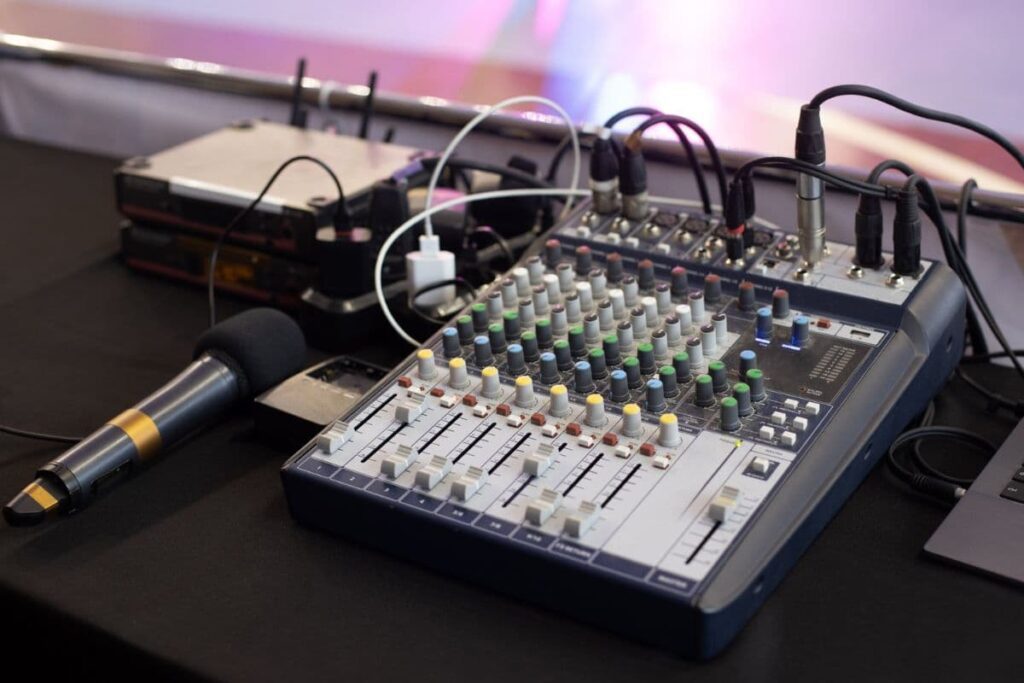Sound mixers can come with many different numbers of channels. Usually, it’s four, eight, 12, 16, 24, or even more, which caters to the needs of everyone, from a home sound engineer to a big live band or even an orchestra. This variety of choices can be mind-boggling, especially if you’re a beginner at recording and playing live, so it’s hard to decide what mixer you need.
Your mixer should have at least eight channels if you want to record your band. If you need a mixer for gigs, you’ll need at least 12 channels, but 16 would be better. It’s better to have extra channels than too few. Ultimately, the number of channels depends on how you intend to use your mixer.
This article will help you decide how big your mixer should be. If you’re in the market for one and unsure what to get, this article will be your starting point, and you’ll soon know what you need.
Table of Contents
- Deciding How Many Channels You Need for Your Mixer
- How Many Channels You Will Need for Recording
- How Many Channels You Will Need for Live Gigs
- Final Thoughts

Deciding How Many Channels You Need for Your Mixer
The first step to getting a suitable mixer for your band is assessing your needs. Do you only plan to record with the mixer, or do you also want to do live gigs with it? What kind of gigs will you play if you use the mixer for live gigs? Are we talking about small club gigs or large venues?
All these factors have to be taken into consideration when getting a mixer. You don’t want to end up with insufficient channels, but you also don’t want to have twice as many as you need. However, it’s a good idea to have a few more channels than you need.
These options will leave you enough space to add new instruments and adapt to unique circumstances.
So, getting a mixer with 12 channels is a good idea if you usually need eight channels.
It might cost more initially, but it’s cheaper than getting a new mixer if you want to introduce new instruments into your band. Plus, if you suddenly have to play a larger venue than usual and need to use more mics than you usually do, you’ll be ready for the challenge.
Let’s see how many channels you might need in different circumstances.
How Many Channels You Will Need for Recording
Suppose you’ve just started a band and want to create some demos or an EP to post online and get some attention. You can choose between renting a studio to record your music and getting a mixer to attempt the DIY route.
Going into a studio will cost less at first, but if you’re looking to record regularly, the costs of renting a studio will quickly accumulate. Plus, finding an appointment that suits everyone in the band and the studio owner might be difficult.
Therefore, getting your own mixer might be an excellent long-term investment. Mixes arent not as expensive as they used to be a few decades ago, so it’s not too expensive for a group of ordinary people to save enough money to buy one.
For home recording, a mixer with eight tracks will do the trick in most cases. You’ll probably record each instrument individually, as it will get you the best results, so even a mixer with only one input would do the trick before you get to the drums.
Even for an average drum kit, eight channels are more than enough, but it’s good to be on the safe side. If you’re on a very tight budget, four channels will do. Most of the time, you’ll mic the kick drum and the snare and use two overheads for the toms, hi-hat, and other cymbals.
If you want to mic every component separately, eight channels will be enough for the average drummer. Eight channels will suffice unless you have a monstrous drum kit with two kick drums and a host of toms and cymbals. And if you do have such a drum kit, you’re probably a pro and record in pro studios.
Therefore, four to eight channels are enough for a decent home recording. With a good set of microphones and some basic mixing and mastering skills, you’ll be able to get good sound quality.
How Many Channels You Will Need for Live Gigs
Things get a bit complicated if you buy a mixer for live audio. The number of channels you require will depend on the number of band members, the equipment you use, and the venue size. Can You Use a Live Mixer for Recording Audio?
For example, in a bigger venue, you’ll have to mic your amps if they’re not strong enough for the gig. On the other hand, you might use Direct Input (DI) boxes instead of amps if you have no suitable amps. You’ll also need more than one vocal microphone for the back vocals (if there are any).
To illustrate things, we’ll assume that you have a typical rock setup that consists of:
- Drums
- Two guitars
- A bass guitar
- Keyboards
- Vocals
- Two back vocals
Let’s also assume that you intend to plug the bass and guitars into amps and that you’re playing a gig in a small venue, and you don’t need to mic the amps because they’re loud enough. In that case, you’ll need at least eight channels, that is:
- Four channels for the drums (the overheads, kick, and snare)
- Three for the vocals
- One for the keyboards
However, this is the bare minimum, so if you want to play gigs regularly, you should get more than that because you never know what surprises you may encounter. Therefore, a 12-channel mixer is the smallest mixer you should get for live gigs.
Playing in a bigger venue, you’ll probably have to mic all the amps. If you have the setup outlined above, that will require three additional channels on the mixer. You might use a DI box instead of a miked amp, but you still need another channel.
A bigger gig also requires stage monitors, so you’ll need to plug them into the mixer. However, bigger venues typically have their mixer, so you hopefully won’t have to worry much about that.
On the flip side, in a tiny venue, a few channels for microphones will be more than enough. Sometimes, you don’t have to mic the drums, so everything will be much easier to pull off.
If you’re planning a podcast featuring regular guests, you might need a mixer. Find out the details in my guide on mixers for two-person podcasts. Do You Need a Mixer for a Two-Person Podcast?
Final Thoughts
That does it for this post, and we hope you’ve picked some helpful advice. Remember to assess your needs and plan accordingly carefully. Don’t buy an enormous mixer if you don’t need to because that’d be an unnecessary investment. But you should also get one that provides more than the bare minimum.
- Review of the ALABS IRON MINI-WL: A Powerhouse Wireless Microphone - October 4, 2023
- What is a Saturator in Music Production: A Brief Explanation - May 11, 2023
- What Are Rotary DJ Mixers? An Overview - May 11, 2023
SoundStudiomagic.com is a participant in the Amazon Services LLC Associates Program, an affiliate advertising program designed to provide a means for sites to earn advertising fees by advertising and linking to Amazon.com. We also participate in other affiliate programs which compensate us for referring traffic.

